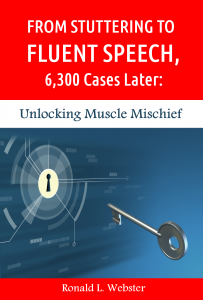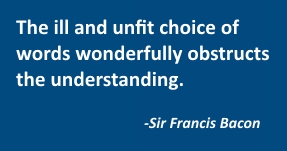 The following is an excerpt from Chapter 3 of the book, From Stuttering to Fluent Speech, 6,300 Cases Later: Unlocking Muscle Mischief. The book is written by stuttering expert and clinical psychologist Ronald. L. Webster, Ph.D. Dr. Webster is founder and president of Hollins Communications Research Institute (HCRI – www.stuttering.org), a nonprofit center dedicated to stuttering research and treatment innovation. The book is available on Amazon.com.
The following is an excerpt from Chapter 3 of the book, From Stuttering to Fluent Speech, 6,300 Cases Later: Unlocking Muscle Mischief. The book is written by stuttering expert and clinical psychologist Ronald. L. Webster, Ph.D. Dr. Webster is founder and president of Hollins Communications Research Institute (HCRI – www.stuttering.org), a nonprofit center dedicated to stuttering research and treatment innovation. The book is available on Amazon.com.
CHAPTER 3 EXCERPT
Stuttering and the Vortex of Verbal Confusion
I firmly believe that a major problem with stuttering is that “stuttering” is not the problem. People talk about stuttering as if it is a real thing. That is not so. No one sees stuttering. When we notice a person repeating sounds and words, struggling to initiate speech, or blocking in attempts to get his or her words out, we then apply the label “stuttering.” However, we do not witness stuttering. We observe classes of behavioral speech events, and then we add the stuttering label to the situation.
 I believe that much of the work that has been done on stuttering also involves major problems with words. I am not referring here to the fact that the stutterer has problems in his or her production of words.
I believe that much of the work that has been done on stuttering also involves major problems with words. I am not referring here to the fact that the stutterer has problems in his or her production of words.
In this case, I mean that the words used to describe and talk about stuttering have contributed to what I perceive to be the persistent ignorance and general lack of therapeutic efficacy that surrounds this disorder. It seems clear to me that difficulties in understanding and successfully treating stuttering have been perpetuated by insufficient rigor in thought about—and poor attention to—how words actually apply to our ideas about events in nature.
In our everyday lives, we often use words loosely. We assume that others know what we mean when we talk to them. We talk about our lives, our problems, our intentions, our likes, and our dislikes, blithely believing that we are being understood. Our politicians blather on and on, using words that seem more like bubbles strung together than substantive thoughts. In fact, on any given day, a politician may cleverly use his or her words with an implied set of meanings and on the next day use the same words to mean something entirely different.
Word meanings can be slippery when used in our daily discourse. One famous politician, when pressed on a point regarding his misbehavior with a White House intern, said, “It all depends on what your meaning of ‘is’ is.” Here he slyly implied that we can assign meanings to words that suit our purposes.
This matter becomes particularly troublesome when we use abstract words and phrases that are not well linked to the physical world. Dictionary definitions of words provide some anchors for meaning by attachment of a word to other clouds of words; however, what we often end up with is a set of abstractions used to identify an initial abstraction.
… [end of excerpt from Chapter 3]
For more information about From Stuttering to Fluent Speech, 6,300 Cases Later: Unlocking Muscle Mischief, visit Amazon.com. To learn more about HCRI stuttering therapy, please click here: www.stuttering.org.


.jpg)